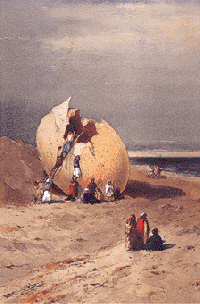Egg
From The Art and Popular Culture Encyclopedia
|
Related e |
|
Featured: |
An egg is an organic vessel grown by an animal to carry a possibly fertilized egg cell (a zygote) and to incubate from it an embryo within the egg until the embryo has become an animal fetus that can survive on its own, at which point the animal hatches.
Most arthropods such as insects, vertebrates (excluding live-bearing mammals), and mollusks lay eggs, although some, such as scorpions, do not.
Reptile eggs, bird eggs, and monotreme eggs are laid out of water and are surrounded by a protective shell, either flexible or inflexible. Eggs laid on land or in nests are usually kept within a warm and favorable temperature range while the embryo grows. When the embryo is adequately developed it hatches, i.e., breaks out of the egg's shell. Some embryos have a temporary egg tooth they use to crack, pip, or break the eggshell or covering.
See also



